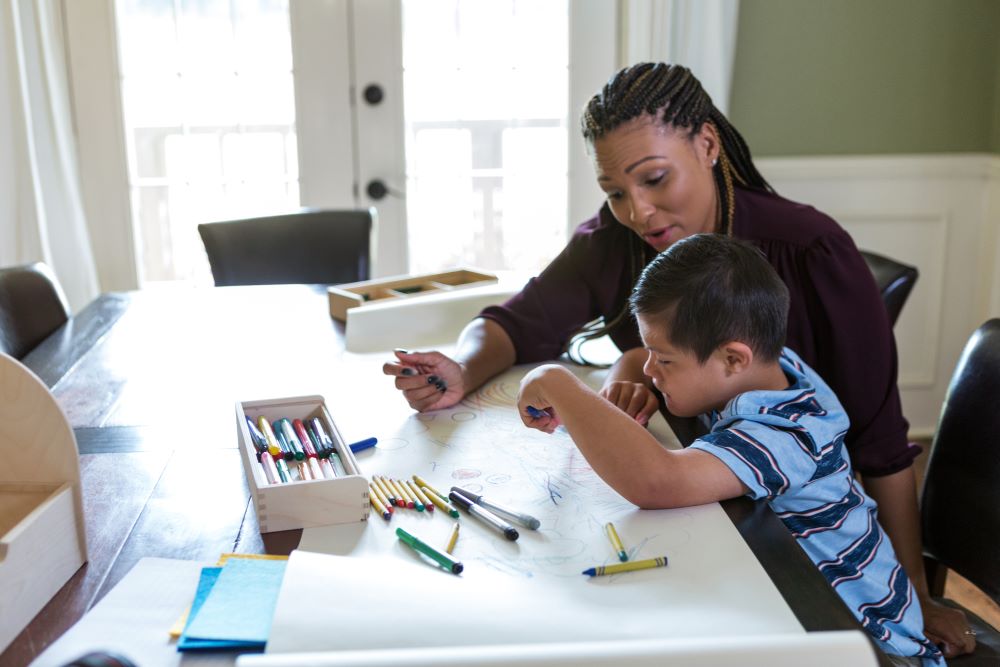Anxiety and art therapy
Article
Anxiety is one of the most common mental health problems for young people and adults. It can be overwhelming and all-consuming, and that’s where art therapy can help.

Anxiety can be caused by many factors, both internal and external, big or small. Relationships, exams, family, finances, health and wider external factors such as the cost-of-living crisis or climate change.
During a recent survey by Mental Health Foundation one in ten (10%) UK adults said they felt ‘hopeless’ about financial circumstances, and more than one-third (34%) felt anxious. A survey by Mental Health UK reported that over eight million people are experiencing an anxiety disorder at any one time. Mind has also reported that each week, 8 in 100 people in England are likely to report mixed anxiety and depression.
How can art therapy help anxiety?
As a recognised form of psychological therapy, delivered by trained art therapists or art psychotherapists, art therapy can help people of all ages and at all stages of life, including those whose life has been affected by difficult personal or cultural experiences, illness and/or disability.
Art therapy uses art as the primary mode of expression, alongside talking with an art therapist, and aims to reduce anxiety by promoting insight, self-compassion and a sense of agency.
During art therapy, you are supported by an art therapist to use art to express and articulate often complex thoughts and feelings through art making. This may be following difficult or traumatic experiences which may be hard to talk about.
Art therapy to express complex feelings
In ‘N’s video below, she talks about how anxiety made her ‘feel trapped in her own mind’ and that it made it difficult for her to ‘be open with other people’. By creating different artworks during art therapy, she was able to ‘express her complex feelings when words wouldn’t work.’ This led to N feeling more ‘in control’ of her emotions.
Later in the video, N goes on to say: ‘it gave me a kind of light bulb moment to go, “okay, this might be how I’m feeling, but actually I am feeling it. It is valid, but it’s not always going to be there.” It kind of gave me that separateness to kind of think, “Okay, this is something in its own right that I can either ignore or I can talk about and try and deal with.”
Art therapy to enable better communication
In a study by Helen Barrett, Sue Holttum, and Tim Wright results show that art therapy and artmaking can enable better communication of experiences through artwork. This can in turn start conversations – a highly impactful tool when ‘words are difficult’. Participants shared how helpful it was to be engrossed, explore, and experiment through art-making which appeared to offer peace and respite from anxieties.
Art therapy to increase trust
Art therapist Andrew Marshall-Tierney has also written about therapist art making as a means of helping service users with anxiety problems, describing the way in which an art therapist making art alongside participants can help ‘reduce anxiety for a service user by increasing trust’.
The ambiguity of the artwork can challenge black and white ways of relating to self and others. The therapist’s artmaking can also be a non-verbal way of increasing understanding of mental health and wellbeing in the person they are supporting.
Art therapy for young people with anxiety
Art therapy can also have a positive impact on young people with anxiety too. In a study by Zoe Moula, exploring the effectiveness of art therapy delivered in school-based settings, children with various complex needs including anxiety and separation anxiety disorders as well as asthma, behavioural difficulties, and learning difficulties were found to have ‘improved quality of life; anxiety levels; self-concept; problem-solving skills, attitudes towards school; and emotional and behavioural difficulties’ following art therapy.
What’s next for art therapy and anxiety?
Anxiety can occur in all different shapes and forms, regardless of age, background, gender or identity, and for a number of reasons. Although there is an emerging evidence-base including indications that art therapy can improve the mental, emotional, and psychological well-being of individuals, there is more research to be done. We need more research on how art therapy can support people with different types and severities of anxiety and make a difference to someone’s life.
Struggling with anxiety?
If you are feeling out of control with anxiety, it is important you seek professional help and reassurance. Despite any feelings of hopelessness, there is help and effective treatment available.
